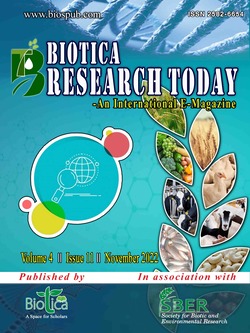
Recent Scope and Developments in Synthetic Vegetable Seeds
Latha G.K.*
Dept. of Vegetable Science, College of Horticulture (Keladi Shivappa Nayaka University of Agricultural and Horticultural Sciences, Shivamogga), Mudigere, Karnataka (577 132), India
Nagesh
Dept. of Plant Pathology, College of Horticulture (University of Horticultural Sciences, Bagalkot), Bagalkot, Karnataka (587 101), India
DOI: NIL
Keywords: Encapsulation, Somatic embryos, Synthetic seeds, Vegetable industry
Abstract
Synthetic seed technology has great potential in the conservation and large-scale multiplication of plant propagules. In recent years much research has been carried out for producing good plant propagules, better conversion rate, good germination rate and preservation. This technology could be more useful where there is a requirement for a huge amount of propagating material or costly hybrid seed. So applicability of this technology is more in the vegetable industry and research so that farmers could get quality planting material at a cheaper rate and produce more vegetables at lower seed rates. Synthetic seed production by encapsulating somatic embryos, shoot buds or any other meristematic tissue can minimize the cost of micro-propagated plantlets for commercialization and final delivery.
Downloads
not found
Reference
Gray, D.J., 1987. Synthetic seed technology for the mass cloning of crop plants: problems and prospects. Horticulture Science 22, 795-814.
Kitto, S.K., Janick, J., 1982. Polyox is an artificial seed coat for asexual embryos. Horticulture Science 17, 488-490.
Murashige, T., 1977. Plant cell and organ culture as horticultural practice. Acta Horticulture 78, 17-30.
Redenbaugh, K., Walker, K., 1990. Role of artificial seeds in alfalfa breeding. Chapter 5. In: Plant Tissue Culture: Applications and Limitations, Developments, Crop Science. (Eds.) Bhojwani,S.S. Volume 19. Elsevier, Amsterdam. pp. 102-135. DOI: http://dx.doi.org/10.1016/b978-0-444-88883-9.50009-1.
